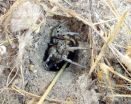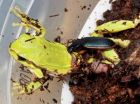Gene-modified stem cells help protect bone marrow from toxic side effects of chemotherapy
2011-05-22
(Press-News.org) SEATTLE – Although chemotherapy is used to kill cancer cells, it can also have a strong toxic effect on normal cells such as bone marrow and blood cells, often limiting the ability to use and manage the chemotherapy treatment. Researchers at Fred Hutchinson Cancer Research Center reported at today's annual meeting of the American Society of Gene and Cell Therapy in Seattle that one possible approach to reduce this toxic effect on bone marrow cells is to modify the cells with a gene that makes them resistant to chemotherapy.
Hans-Peter Kiem, M.D., a member of the Hutchinson Center's Clinical Research Division, and colleagues Jennifer Adair, Ph.D., a research associate in the Clinical Research Division, and Maciej Mrugala, M.D., Ph.D., M.P.H., a neuro-oncololgist at the Seattle Cancer Care Alliance and the University of Washington, presented data from a clinical trial in which bone marrow stem cells from patients with brain tumors were removed and modified with a retrovirus vector to introduce the chemotherapy-resistant gene. The cells were then re-infused into the patients. In the trial, which was designed to evaluate safety and feasibility, patients were safely administered gene-modified blood stem cells that persisted for more than one year and did not show any apparent harmful effects.
This approach was first attempted in patients with a terminal form of brain cancer called glioblastoma. Currently, median survival for glioblastoma patients is just 12 to 15 months. The prognosis for glioblastoma patients is poor not only because no curative treatment is available but because doctors cannot effectively use the treatment that does exist. Glioblastoma cells make a large amount of a protein called MGMT that makes them resistant to chemotherapy, so doctors use a second drug, called benzylguanine, to knock down MGMT and make the tumor cells susceptible to the chemotherapy. However, this potent one-two punch is not limited to the brain tumor cells. Benzylguanine also disables MGMT in normal blood and bone marrow cells, leaving them also susceptible to the effects of chemotherapy. The effects on patients' blood and bone marrow can be pronounced and often limit the ability to effectively administer the chemotherapy.
"Our initial results are encouraging because our first patient is still alive and without evidence of disease progression almost two years after diagnosis," Kiem said.
The results of the trial suggest the administration of the modified cells represent a safe method for protecting marrow and blood cells from the harmful effects of chemotherapy in brain tumor patients. Future clinical trials will be done to determine whether this combination chemotherapy will also improve the survival of patients with glioblastoma.
INFORMATION:
At Fred Hutchinson Cancer Research Center, our interdisciplinary teams of world-renowned scientists and humanitarians work together to prevent, diagnose and treat cancer, HIV/AIDS and other diseases. Our researchers, including three Nobel laureates, bring a relentless pursuit and passion for health, knowledge and hope to their work and to the world. For more information, please visit fhcrc.org.
END
ELSE PRESS RELEASES FROM THIS DATE:
2011-05-22
New research provides evidence for significant differences between new and old red blood cells used for transfusions and could provide a cheap, rapid and effective way to monitor the quality of blood supplies.
Even with preservatives, blood stored in banks continues to age, resulting in biomaterials leaking from the red blood cells and subsequent changes to cell properties and function. There have been concerns raised worldwide about using older stored blood because of questions about various changes believed to affect the quality of the red blood cells. Currently, ...
2011-05-22
Researchers from the King Juan Carlos University (URJC) have carried out a research study published in Biological Conservation, which looked at whether spiders were more tolerant of human impact than other animals. The answer was no: arachnids suffer the consequences of changes to their landscape just like any other animal.
"The abundance and number of spider species is negatively affected by the impact of many human land uses, such as habitat fragmentation, fire and pesticides", Samuel Prieto-Benítez and Marcos Méndez, researchers at the URJC Biodiversity and Conservation ...
2011-05-22
Together with the national science academies of the other G8 states, the German National Academy of Sciences Leopoldina has prepared two statements for the G8 states in the run-up to the G8 Summit of Heads of State and Government. The recommendations contained in these statements were now presented to the participating governments for the negotiations in Deauville, France on 26 and 27 May. In a statement on the topic of "Education for a Science-Based Global Development", the academies urge governments to target investment to establish an infrastructure for a globalization ...
2011-05-22
The University of Southampton is playing a key role in a major public/private partnership to evaluate the use of biomass to create a cost effective and sustainable UK energy system for 2050.
Domestic biomass (a renewable energy source from living, or recently living organisms, such as plants, rubbish and wood), sustainably grown in the UK, could provide up to 10 per cent (1) of the UK's energy needs by 2050 and significantly contribute to the reduction of greenhouse gas (GHG) emissions.
Three new bio energy projects launched by the Energy Technologies Institute (ETI), ...
2011-05-22
This week the scientific journal Ecology Letters has published a synthesis of the ecological impacts of invasive plants worldwide. This global analysis has been based on more than one thousand studies that in total describe the impacts of 135 invasive plant species. The lead author, Dr. Montserrat Vilà, a professor at the Spanish Higher Research Council (CSIC) adds: "This assessment would have been impossible to achieve ten years ago, because the evidence was anecdotal, it has only been in the last decade that well designed field studies have been conducted".
Twenty-four ...
2011-05-22
Many drugs sold as 'legal highs' on the internet do not contain the ingredients they claim. Some instead contain controlled substances and are illegal to sell over the internet. These are findings of Dr. Mark Baron, who bought a range of tablets from different websites to see what each contained. The study is published today in the journal Drug Testing and Analysis.
"It is clear that consumers are buying products that they think contain specific substances, but that in reality the labels are unreliable indicators of the actual contents," says Dr. Baron, who works in the ...
2011-05-22
VIDEO:
Wizen and Gasith's current study shows that adult Epomis beetles can prey upon live amphibians, in addition to their regular diet.
Click here for more information.
New findings of researchers from Tel-Aviv University show that predator-prey interactions between ground beetles of the genus Epomis and amphibians are much more complex than expected. The study was published in the open access journal Zoo Keys.
"Amphibians are typical insect predators and their diet ...
2011-05-22
Rima Taher, an expert in the design of low-rise buildings for extreme winds and hurricanes, will speak next week at the Annual Conference of Construction Specifications Canada (Devis de Construction Canada) in Montreal. Taher, a university lecturer in NJIT's College of Architecture and Design, is a civil and structural engineer, http://www.njit.edu/news/experts/taher.php. Construction Specifications Canada (http://csc-dcc.ca) is a national, non-profit association with chapters across Canada. Its mission is to deliver and develop quality educational programs, publications ...
2011-05-22
AMES, Iowa – Iowa State University's Hans van Leeuwen has moved his research team's award-winning idea for improving ethanol production from a laboratory to a pilot plant.
Now he knows the idea, which produces a new animal feed and cleans water that can be recycled back into ethanol production, works more efficiently in batches of up to 350 gallons than on a lab bench.
"We're learning we can reliably produce good quality and good quantities," said van Leeuwen, Iowa State's Vlasta Klima Balloun Professor of Engineering in the department of civil, construction and environmental ...
2011-05-22
(Boston) - Investigators from the Slone Epidemiology Center at Boston University have reported that African American women who consumed a diet high in vegetables and fruit gained less weight over a 14-year period than those who consumed a diet high in red meat and fried foods. This is the first prospective study to show that a healthier diet is associated with less weight gain in African American women, a population with a high prevalence of obesity. The study results, published in the American Journal of Clinical Nutrition, were based on data from the Black Women's Health ...
LAST 30 PRESS RELEASES:
[Press-News.org] Gene-modified stem cells help protect bone marrow from toxic side effects of chemotherapy


